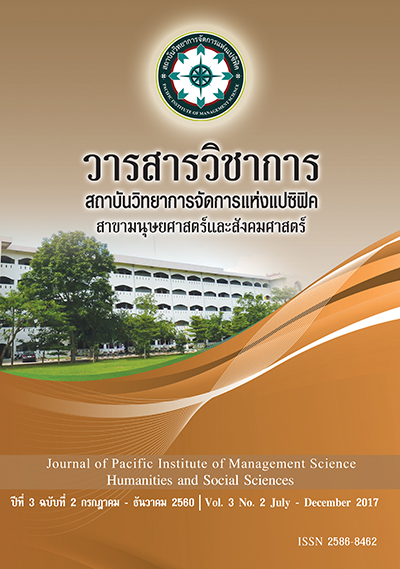Results based Management regarding on Effectiveness of Small-sized Schools in Upper Part of Northeast Region of Thailand
Keywords:
Results based Management, Effectiveness, Small-sized SchoolsAbstract
Effectiveness of Small-sized Schools in Upper Part of Northeast Region of Thailand,” aimed 1) to study the state of results based management regarding on effectiveness of small-sized schools in upper part of Northeast region of Thailand, 2) to create and develop the model of results based management regarding on effectiveness of small-sized schools in upper part of Northeast region of Thailand, and 3) to evaluate the model of results based management regarding on effectiveness of small-sized schools in upper part of Northeast region of Thailand. The research process consisted of three steps as follows: the first step was the study of concepts, theories, principles, and state of results based management regarding on effectiveness of small-sized schools in upper part of Northeast region of Thailand. The second step was the creation and development of results based management model regarding on effectiveness of small-sized schools with the data collected from 12 experts and 13 persons participating in a focus group discussion. The third step was the evaluation of results based management model regarding on effectiveness of small-sized schools with the data collected by questionnaire from 12 experts on the appropriateness, consistency, advantage.
The instruments used in this research were the questionnaire, interview form, focus group discussion, and the evaluation by the experts. The statistics used for quantitative data analysis in this research were percentage, mean, frequency, and standard deviation.
The research findings revealed that
- The state of results based management regarding on effectiveness of small-sized schools in upper part of Northeast region of Thailand, overall was at high level. Generally, those schools were under the Office of the Basic Education Commission, of which their works were classified into four aspects, namely, academic affairs management, budget management, personnel management, and general management.
- The model of results based management regarding on effectiveness of small-sized schools in upper part of Northeast region of Thailand consisted of three parts: the results based management had seven aspects, namely, 1) organization’s objectives and targets, 2) goal settings and key performance indicators, 3) agreement perceived for targets, 4) information technology system management, 5) continuous improvement, and 6) reward and praise. Every performance had to do through the PDCA process as follows: 1) plan, 2) do, 3) check, and 4) act. These steps would bring the effectiveness to the small-sized schools in four aspects, namely, academic affairs, budget management, personnel management, and general management. There were seven factors supporting the results based management, that is, 1) leadership of all level administrators, 2) information system setting for performance results, 3) giving importance and personnel development, 4) effectiveness of general management, 5) appropriate organization, 6) learning cultured organization, and 7) increasing members’ authority. The results based management must attach to the seven principles as follows: 1) participation for all, 2) accountability, 3) transparency, 4) simplicity, 5) learning by doing, 6) widely implementation, and 7) cost saving and wisely resources utilization.
- The evaluation of results based management regarding on effectiveness of small-sized schools in upper part of Northeast region of Thailand, both overall and each aspect was that the performance aspect with the appropriateness, consistency, possibility, and benefit, was at the high level.
References
วันชัย ดนัยตโมนุท และไกร เกษทัน. (2543). การกระจายอำนาจการบริหารการศึกษาตามแนวพระราชบัญญัติการศึกษา แห่งชาติ พ.ศ. 2542. กรุงเทพมหานคร: โรงพิมพ์การศาสนา. วิกิพีเดีย สารานุกรมเสรี. (2555). ภาคอีสาน (ประเทศไทย). เข้าถึงได้จาก https://th.wikipedia.org/wiki/
นชิาภา. (2552). การบรหิารแบบมุ่งผลสัมฤทธิ์ให้สัมฤทธิ์ผล. เข้าถึงได้จาก https://www.tpa.or.th/writer/author_des. php?authorID=1769)
ประกอบ คุปรัตน์. (2555). การบริหารโรงเรียนขนาดเล็กในประเทศไทย. เข้าถึงจาก pracob.blogspot.com/2012/07/ blog-post.html )
มณีรัตน์ บุญเต็ม (2554) การบริหารแบบมุ่งผลสัมฤทธิ์. เข้าถึงได้จาก https://www.gotoknow.org มหาวิทยาลัยนเรศวร. (2545). ข้อมูลทั่วไปของภาคอีสาน. เข้าถึงได้จาก https://student.nu.ac.th/isannu/province/isan.htm
วีระยุทธ ชาตะกาญจน์. (2547). การบริหารแบบมุ่งผลสัมฤทธิ์. เข้าถึงได้จาก Available: URL:https://mail.rint.ac. th/~edu/w_vichakran/personal.doc.
สุภาภรณ์ คงคานนท์. (มปป.) การบริหารแบบมุ่งผลสัมฤทธิ์กับการบริหารจัดการศึกษาในสถานศึกษา. เข้าถึงได้จาก https:// gotoknow.org/blog/suphaphonkhong..
สุรัฐ ศิลปอนันต์. [ออนไลน์]. (2545). กระบวนการปฏิรูปโรงเรียนที่มีประสิทธิภาพ. เข้าถึงได้จาก www.lib.neu.ac.th/.
สำนักงานคณะกรรมการการศึกษาขั้นพื้นฐาน, (2555). โรงเรียนขนาดเล็ก : ความท้าทาย, เข้าถึงได้จาก www.obec.go.th
สำนักนโยบายและแผนการศึกษาข้ันพื้นฐาน. [ออนไลน์]. (2551). แนวทางการพัฒนาคุณภาพโรงเรียนขนาดเล็ก. เข้าถึงได้จาก www.obec.go.th
Downloads
Published
Issue
Section
License
บทความที่ได้รับการตีพิมพ์เป็นลิขสิทธิ์ของ สถาบันวิทยาการจัดการแห่งแปซิฟิค
ข้อความที่ปรากฏในบทความแต่ละเรื่องในวารสารวิชาการเล่มนี้เป็นความคิดเห็นส่วนตัวของผู้เขียนแต่ละท่านไม่เกี่ยวข้องกับสถาบันวิทยาการจัดการแห่งแปซิฟิค และคณาจารย์ท่านอื่นๆในสถาบันฯ แต่อย่างใด ความรับผิดชอบองค์ประกอบทั้งหมดของบทความแต่ละเรื่องเป็นของผู้เขียนแต่ละท่าน หากมีความผิดพลาดใดๆ ผู้เขียนแต่ละท่านจะรับผิดชอบบทความของตนเองแต่ผู้เดียว







